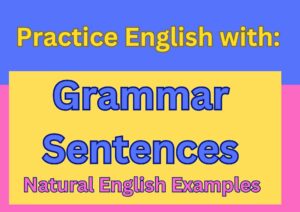40 Sentences With Likewise: Better English Speaking!
Today we are going to check out 40 sentences with likewise, including likewise questions, to practice our English!
40 Sentences With Likewise: Better English Speaking! Read More »

Grammar is a key part of learning English. It helps you communicate clearly and confidently. Understanding grammar structures can make speaking and writing easier. In this section, we focus on English grammar sentences – natural examples that show how different grammar rules work. Practice reading and repeating them. These sentences help you see how grammar structures fit together. By practicing with these examples, you can improve your skills and sound more natural. Whether you’re writing emails or having a conversation, good grammar makes a big difference. Let’s dive into some examples and see how grammar can strengthen your English.
Grammar is important because it helps us structure sentences in a clear and understandable way. Without proper grammar, communication can become confusing. It allows you to express ideas accurately, whether you’re speaking or writing. By studying English grammar sentences, you can see how different grammar rules work in context. These example sentences help you understand how to use tenses, word order, and other grammar features correctly. Practicing with these sentences improves your ability to form well-structured, natural sentences. In the end, good grammar makes your English easier to understand and more effective in everyday situations.
Practice is key to improving your English grammar. Start by reading simple books or articles. Pay attention to sentence structure and grammar patterns. Try writing short sentences every day. Focus on one grammar rule at a time, like verb tenses or prepositions. Studying example sentences is also very helpful. They show you how grammar works in real conversations. On this website, you can practice grammar sentences, which will give you clear examples from which to work with. Don’t be afraid to make mistakes. The more you practice, the better you’ll get. Listening to native speakers will also help. Over time, your grammar will improve, and your confidence will grow.
There are so many grammar sentences to be found here at Natural English Central. Here are some examples, with links to the articles on our site that practice them further:
A gerund is a verb form ending in “-ing” that acts as a noun. It can be the subject or object of a sentence. See our article on gerunds here.

Examples:
Pronouns are words that take the place of nouns. They help avoid repetition and make sentences smoother. Common pronouns include “he,” “she,” “it,” “they,” “we,” and “you.” Using pronouns correctly is important for clear communication. See our article on pronouns here.

Examples:
Direct and indirect speech are useful to know about in order to improve our English. Direct speech is when you repeat someone’s exact words, usually with quotation marks. Indirect speech, also called reported speech, is when you paraphrase what someone said, without using their exact words. See our article on direct and indirect speech here.

Examples:
The simple past tense is used to describe actions that happened and were completed in the past. Regular verbs usually end in “-ed,” while irregular verbs change form entirely. See our article on the simple past here.

Examples:
A present participle is a verb form ending in “-ing” that shows an action happening now or a continuing action. It can be used as part of verb tenses or as an adjective. See our article on the present participle here.
Examples:
Learning singular and plural forms is very helpful for your English grammar improvement.
Singular nouns refer to one person, thing, or idea, while plural nouns refer to more than one. Plural nouns are usually formed by adding “-s” or “-es” to the singular form. See our article on singular and plural here.
Examples:
Studying antonyms is also a good way to improve your English. Whilst not strictly grammar, they are more about boosting vocabulary, learning to use lots of different words in sentences is excellent grammar practice in general! See our article on antonyms here.
Antonyms are words that have opposite meanings. Learning antonyms helps you understand the full range of a word’s meaning and can improve your vocabulary.
Examples:
Here are some more examples of English grammar sentences. This time, we’ll look at ones that practice a variety of English grammar forms. These sentences cover different tenses, voices, and structures, such as the present perfect, passive voice, and reported speech. By reading through these examples, you can get a better sense of how different grammatical rules work in everyday language.

These sentences show different ways we use English to describe actions, events, and thoughts, from simple statements to more complex ideas.
And now here are a variety of grammar structures once again, but this time they practice questions and answers. That’s important if you are looking to improve your English communication skills.
1. Q: Do you like playing soccer?
A: Yes, I love playing soccer.
2. Q: Where did you go on vacation last year?
A: I went to Spain for two weeks.
3. Q: Have you ever been to New York?
A: Yes, I’ve been there twice.
4. Q: What time does the train leave?
A: The train leaves at 5:30 PM.
5. Q: Why was the meeting canceled?
A: The meeting was canceled because of the snowstorm.
6. Q: Can you help me with my homework?
A: Sure, I can help you after dinner.
7. Q: Did you see the new movie last night?
A: No, I didn’t. I was too tired.
8. Q: What are you going to do this weekend?
A: I’m going to visit my grandparents.
9. Q: Have you finished the project yet?
A: Yes, I’ve already finished it.
10. Q: Why is the window open?
A: The window is open because I need some fresh air.
Let’s try a short grammar sentences quiz. Please try to find the incorrect part of each sentence. Answers can be found at the bottom.

Answer Key: 1. was eating, 2. watched, 3. are, 4. went, 5. reading, 6. are playing, 7. had, 8. don’t like, 9. would come, 10. Did, see
The above English grammar sentences are but just a few examples of what you can find here at Natural English Central. For example, we mentioned above that we can practice making simple past tense sentences. But we also have example sentences for other tense forms and other grammar structures. Feel free to explore this site to find something you’d like to practice!
Today we are going to check out 40 sentences with likewise, including likewise questions, to practice our English!
40 Sentences With Likewise: Better English Speaking! Read More »
Today we are going to check out 50 sentences with instead, including questions that use istead, to practice our English!
50 Sentences With Instead: Better English Speaking! Read More »
Today we are going to check out 40 sentences with indeed, including hence questions, to practice our English!
40 Sentences With Indeed: Better English Grammar! Read More »
Today we are going to check out 40 sentences with hence, including hence questions, to practice our English!
40 Sentences With Hence: Better English Grammar! Read More »
Today we are going to check out many sentences with consequently, including consequence questions, to practice our English!
30 + Sentences With Consequently: Better English Grammar! Read More »
Today we are going to check out many sentences with besides, including questions, to practice our English speaking, and grammar.
40 Sentences With Besides: Better English Grammar! Read More »
Today we are going to check out many sentences with again, including questions, to practice our English speaking and grammar.
45 Sentences With Again: Better English Communication! Read More »